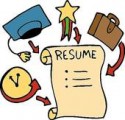Resume Basics: What is it?

So first of all, why do we need to know about resumes? It’s because resumes are one of the most important tools students like yourself can use to find your first job.
But first, what is a resume? A resume is a short and to the point piece of paper that gives your dream company and future employers a better idea about whom you are. It will be a summary of your accomplishments, including but not limited to education, work experience, skills and talents. Before getting started on your resume, take the time to list out your strengths and skills.
Depending on your goal, you can change the type of resume you create. If you’re applying for a job, talk about your relevant skills that pertain to that job; if it’s for a volunteer position, talk about why you’re passionate about the organization and cause. There are three general types of resumes you should be aware of:
A functional resume is one that focuses on your skills and talents. As a young student, chances are you might not have a lot of work experience so a functional resume will be well suited for you. Focusing on your skills will help highlight why you will do a good job at a new workplace.
A chronological resume is one that focuses on your experience. If you feel that over the years you’ve developed quite a few experiences, you can try this resume format and list your accomplishments in order of time they happened. More often than not, the experiences should be listed with the most recent experiences first. Remember to include who it is you worked for or volunteered with and where it was located.
After you’ve mastered both the functional and chronological resume you can proceed to try the hybrid version of the two. This means you will be talking about your strengths, talents and listing out your past experiences. Important tips to note on your resume: Don’t forget to give the sections on your resume different headings. The last thing you want to do is confuse the reader! Make sure to include your personal information: this includes your full name, address and most importantly, your contact number and email address for employers to get in touch. It is important that your resume be clear and easy to read. When employers go through mountains of resumes, they need to be quick in understanding your skills and experiences.
References:
http://how-to-write-a-resume.org/
http://career-advice.monster.com/resumes-cover-letters/resume-writing-tips/how-to-write-a-resume/article.aspx
http://career-advice.monster.com/resumes-cover-letters/resume-writing-tips/how-to-write-a-resume/article.aspx





Leave a comment!